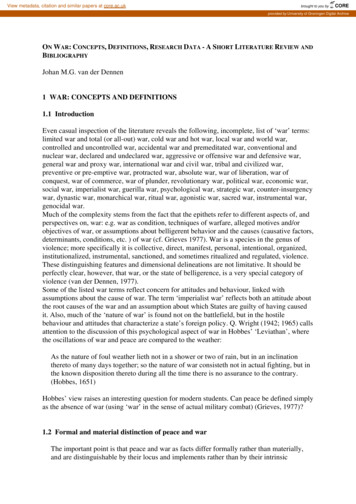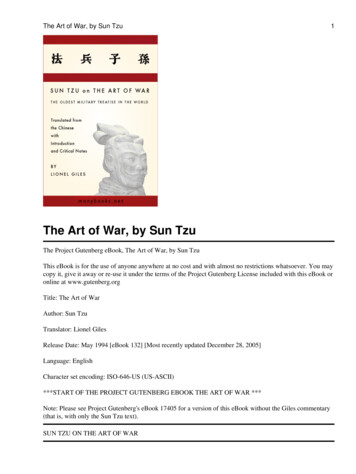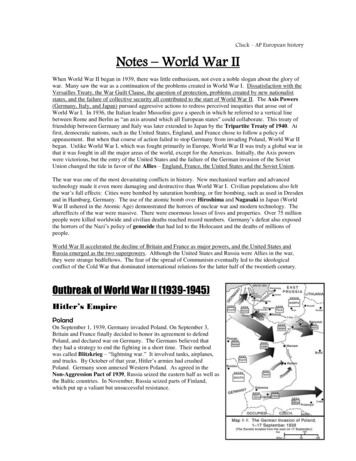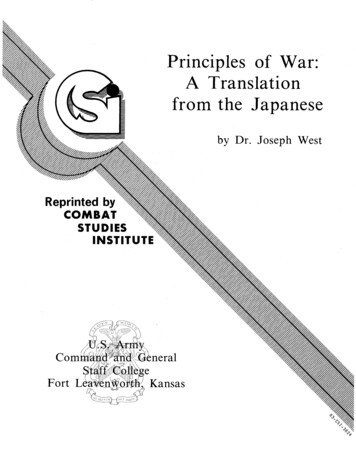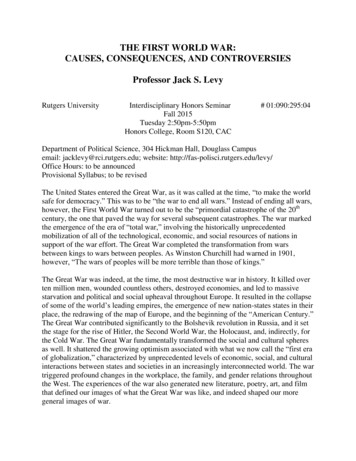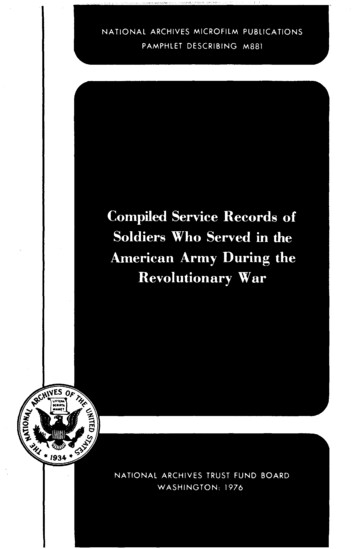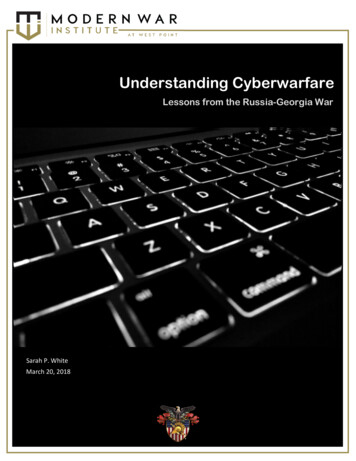
Transcription
Understanding CyberwarfareLessons from the Russia-Georgia WarSarah P. WhiteMarch 20, 2018
Understanding Cyberwarfare: Lessons from the Russia-Georgia WarCapt. Sarah P. “Sally” White is a cyberspace operations officer inthe US Army. She is currently pursuing her PhD in the HarvardDepartment of Government, where her research interestsinclude military innovation and comparative cyberspacedoctrine. She has served in the 82nd Airborne Division and the780th Military Intelligence Brigade (Cyber). Following graduateschool, she will serve as an instructor in the West PointDepartment of Social Sciences.
Understanding Cyberwarfare: Lessons from the Russia-Georgia WarCyberattacks had become an established toolattacks, with the highest levels of onlineof statecraft by the time they were used againstactivity coinciding with the Russian invasion ofthe Republic of Georgia in the summer ofSouth Ossetia on August 8, 9, and 10. 3 Even the2008, albeit one without a legal framework andNational Bank of Georgia had to suspend allwhose long-term implications remained poorlyelectronic services from August 8–19. 4 Whileunderstood. Nevertheless, the war betweenthere is strong political and circumstantialRussia and Georgia that took place in August ofevidence that the attacks were encouraged bythat year was remarkable for its inclusion of atheseries of large-scale, overt cyberspace attacksattribution—andthat were relatively well synchronized withculpability—have remained itivelegalconventional military operations. ConductedThe cyberattacks had little effect onby an army of patriotic citizen hackers, theconventional forces and were not decisive tocyber campaign consisted of distributed denialthe outcome ofofservice (DDoS) attacks and websitenevertheless offer significant lessons on thedefacements that were similar in nature butcharacter of modern warfare for scholars ofdifferent in method to what had occurred inconflict and military studies. This paper willEstonia the year prior. In total, fifty-four news,offer a brief analysis of several of those lessons.government, and financial websites wereFirst, the attacks reinforced the Russiandefaced or denied, with the average denial ofinterpretation of cyberspace as a tool forservice lasting two hours and fifteen minutesholisticand the longest lasting six hours. 2 Internetnetworksthe conflict, 5 but nandBytheimpedingabilitytoreact,respond, and communicate, the cyberattackssuffered decreased functionality during theExamples of the state-sponsored use of cyberattacks prior to 2008 include espionage (e.g., Titan Rain,Moonlight Maze), support to precision military raids (e.g., Operation Orchard), sabotage (e.g., Stuxnet, theplanning for which is estimated to have begun in 2007), and coercion (e.g., Estonia). Several books provide anaccounting of these and other events, to include Segal, Hacked World Order; Kaplan, Dark Territory; and Healy,Fierce Domain.12Tikk et al., Cyber Attacks against Georgia.3Russell, “Georgia-Russia War.”4Ibid.Interviews conducted with members of the Georgian military, government, and defense ministry, June 2017,in the Republic of Georgia, reinforced the point that while the cyberattacks added a layer of chaos to theGeorgian response, they did not affect military decision making about the crisis in a significant way.51
Understanding Cyberwarfare: Lessons from the Russia-Georgia Warcreated the time and space for Russia to shapethey are used almost exclusively in referencethe international narrative in the critical earlyto Western activities. 6 While the US militarydays of the conflict. Second, the attackshashighlighted the role of third forces on thecyberspace as a discrete domain of warfaremodern battlefield. These forces ranged fromthat deserves its own doctrine, its own troops,the citizen hackers who perpetrated theand its own unique menu of lethal andattacks to the private companies who werenonlethal effects, Russia treats cyberspace as arelied on to defend against them. And third, thesubordinate component to its holistic doctrineattacks provide a useful demonstration of howof information warfare. 7 Cyber operations, tothe technical concepts of cyberspace can bethe Russian mind, are regarded more broadlyunderstood through conventional operational“as a mechanism for enabling the state toconcepts in order to more effectively integratedominate the information landscape,” ratherthem with military operations.than as aestablishedachievementanunderstandingofnarrow mechanism for theofdiscreteeffectsoncommunication systems. 8 This distinction isevident in the Russian use of the phrase“information security” rather than the morenarrowly technical notion of “cybersecurity”that prevails in US discussion. 9Cyberattacks in the Russia-Georgia WarReaffirm the Russian View of Cyberspace as aFurthermore, the Russian conception ofTool for Psychological Manipulation andinformation warfare is also more holistic inInformation . Whereas the West tends toIn analyzing Russian cyber doctrine, one mustview information as data that is transmittedunderstand that neither the word “cyber” norand stored on networks—a data- and system-the term “hybrid warfare” exist independentlycentric perspective that arose out of thein the Russian conceptual framework; instead,information theory movement of the mid-6Giles, “Russia’s ‘New’ Tools for Confronting the West.”Medvedev, “Military Doctrine of the Russian Federation”; Giles, “Military Doctrine of the Russian Federation2010.”78Connell and Vogler, “Russia’s Approach to Cyber Warfare.”9Thomas, “Information Security Thinking.”2
Understanding Cyberwarfare: Lessons from the Russia-Georgia Wartwentieth century—other conceptions seeconcerned with threats to the hardware andinformation as aplatform for shapingsoftware of the Internet rather than threats toindividual and collective perception, to alterthe psyche of users, the Russian informationhow people make decisions and how societiessecuritysee the world. 10 The Russian conception ofpsychologicalinformation warfare reflects this second, morethreats with equal severity. 13 The 2016 versionpsychological tone. Shaped by a history ofof this doctrine, for example, describes theconfrontation with adversaries who werethreat of an “informational pressure” that hastechnologically and economically superior, the“the aim ofdiluting traditional RussianRussianspiritual-moralvalues.” g victory through a qualitative, near-language of the past three iterations of thisspiritual sense of moral superiority. 11 Thisdoctrine suggest that Russia is just asmoral superiority required the deliberateconcerned withcultivation of a sense of psychological andperceptual, and cultural integrity as it is withcultural integrity that was strong enough tothe physical state of networks or their residentwithstand the effects of outside influence.data.Furthermore, theimperatives ofNoticeablySovietmaintaining psychological,absentfromtheseauthoritarianism depended on the tight controldiscussions on cyber conflict is any mention ofof information flows to prevent the populationthe role of thefrom mobilizing against state power. 12something that US and British governmentsoffense in cyberspace,The Russian approach to the Internethave far more openly discussed. There aretoday is in many ways a natural evolution ofseveral possible motivations for this absence,this cultural legacy. Unlike the US cybersecuritynot the least of which concerns the legitimateframework, which has been overwhelminglydesire to keep offensive capabilities secret. An10Lawson, “Russia Gets a New Information Security Doctrine.”11Adamsky, Culture of Military Innovation.12Soldatov and Borogan, Red Web.13Thomas, “Information Security Thinking.”Galperovich, “Putin Signs New Information Security Doctrine.” The new information security doctrine is of thesame spirit as both the 2000 and 2010 versions, the former of which includes as threats, “the devaluation ofspiritual values, the propaganda of examples of mass culture which are based on the cult of violence, and onspiritual and moral values which run counter to the values accepted in Russian society.” Quote taken from Giles,“Information Troops.”143
Understanding Cyberwarfare: Lessons from the Russia-Georgia Warequallyplausiblerigidcharacteristic that was reflected in the Russia-delineations between offense and defense areGeorgia War. The specific targets selected forboth difficult to establish and logicallytheunnecessary in a cyberspace doctrine that isgovernment from its most effective means ofmore psychologically than technically oriented.strategic communication and, in the process,A 2007 article in Moscow Military Thoughtrendered it unable to communicate with eitherreinforces this idea: “In our view, isolatingits own population or with the outside world.cyber terrorism and cyber crime from theRussia then filled the void created by thisgeneral context of international informationinformationsecurityandpropaganda campaign that allowed it tounsupported by any objective necessity.” 15 Bysaturate the news media with its own versionwrappingofof events. 16 Furthermore, while analysts agreecybersecurity into an idea of informationthat Russian hackers had the expertise tosecuritymorecreate lasting physical effects on Georgianpsychologically defensive, Russia creates theinfrastructure, their avoidance of doing soconceptual space to stretch the boundariesreinforcesbetween offensive and defensive activity—asmanipulation and narrative control was a usRussiandisinformation hananystructural or service degradation the hackersUnderstanding Russia’s psychologicalmay have been able to create. 17 The significantapproach to information warfare—and furtheramount of time that Russian hackers spentunderstandingwarfarediscussing the merits and drawbacks ofapproach to cyberspace operations—allowsdifferent kinds of malware further suggests anone to evaluate the 2008 cyberattacks in theirunderstanding ofproper context. A distinguishing characteristicstrategic needs. 18 It is worth noting, however,of psychological warfare concerns its tendencythat the technical success of the cyberattacksto target populations rather than militaries, awas not matched by a success with the strategicitsinformation15Giles, “Information Troops.”16Deibert, “Cyclones in Cyberspace.”17Bumgarner and Borg, Overview by the US-CCU.18Russia-Georgia Cyber War—Findings and Analysis.4the campaign’s higher
Understanding Cyberwarfare: Lessons from the Russia-Georgia Warnarrative, as the Russians failed to gaininformationwarfareratherinternational consensus around their versionfundamentallyof events. Lessons learned from this failure leddomain. 20 The 2008 Russia-Georgia War wasdirectly to Russian success in Ukraine six yearsthe first overt test of this approach in alater. 19conventional military context; in the decadesseparatethanasawar-fightingIn cyberspace as in physical space, it issince, it has been implemented with increasingcrucial to avoid interpreting the actions of anrefinement both inside and outside the post-adversary from the lens of one’s own doctrine.Soviet sphere and both inside and outside aRussian behavior in cyberspace in Georgia andconventional military setting. 21beyond must therefore be evaluated within thecontext of Russia’s conceptual orientation tothe cyberspace domain. This orientationmanifests itself in an information securitydoctrine that is preoccupied with a sense ofboth physical and psychological vulnerabilityCyberattacksintheRussia-GeorgiaWarand that, therefore, implicitly grants societalHighlight the Increasing Relevance of Thirdtargets the same legitimacy as military ones. AsForces to Future Conflicta result, the Russian perspective on cyberspaceviews deception, manipulation, and denial asThe cyberattacks of the Russia-Georgia Warlegitimate tools of statecraft that today’s massprovide empirical evidence of the extent tocommunication platformsreadily enable.which cyberspace empowers third-party non-Actions that we would characterize as discrete,state actors in modern conflict. The US Armytechnical, and fundamentally offensive inStrategic Studies Institute categorizes thesecharacter—suchwebsiteactors as “third forces,” or “organizations thatdefacement—instead reflect Russia’s holisticcan influence the outcome of armed conflictapproach toasDDoSandcyberspace as a tool ofGiles, “Information Troops.” This idea of Georgia as a warm-up for Ukraine, in physical and in informationalspace, was also reinforced during author interviews in Georgia.19Russia has employed many of these same information-warfare tools against domestic audiences, as Soldatovand Borogan describe in The Red Web.20Since 2008, Russian has conducted cyber operations and information operations in conjunction with amilitary campaign in Ukraine and Syria and absent a military campaign in Finland, Latvia, France, Germany,and the UnitedStates.215
Understanding Cyberwarfare: Lessons from the Russia-Georgia Warbut are not, strictly speaking, combatants.” 22RussianpoliticalculturehastwoThe Russia-Georgia War provides severalattributes that make it particularly adept atexamples of how third forces can exertmarshaling these non-state cyber resources ininfluence on the battlefield both inside andthe service of its strategic goals, a process thatoutside state control. The first such example isAlexander Klimburg calls “mobilizing cyberthe Russian hackers themselves. Russia has apower.”26 The first is a historically cozywell-documentedemployingrelationship between the state and organizedcivilians, criminal syndicates, and armies ofcrime. In cyberspace this relationship is mostsocial media bots 23 to rapidly increase theevident in the nefarious online activity of thedepth and breadth of its offensive cyberRussian Business Network (RBN), which is thefootprintonly criminal organization identified by NATO aswithhistoryminimaloflevels ofstateattribution. 24 In this tradition, the cyberattacksa major strategicin Georgia were not perpetrated by aFoundation identified at least six different C2uniformed arm of the Russian state, but byservers used in the conflict, all of which had apatriotic citizens who were engaged andpreexisting record of DDoS activity.28 Some ofrecruited through social media. The primarythe zombie computers involved even conductedhacker forums for coordination and toolattacks on unrelated e-commerce websitesdisseminationandamidst the Georgia campaign. 29 The secondcommunitiesattribute that enables Russian recruitment of itswithin them followed a distinct hierarchy inpatriotic hacker community is a long-standingwhich the more technically skilled forumpolitical tradition of propaganda, agitation, andleaders provided the tools, vulnerabilities, andnarrative control designed to shape thetarget lists for the less tech-savvy followers tocollective psyche and mobilize the popularaction. 25consciousness in service of the state. ThisStopGeorgia.ru.wereThexaker.ruhackerthreat. 27 ShadowServer22US Army War College Key Strategic Issues List 2016–2017.23Chen, “Agency.”24Klimburg, “Mobilising Cyber Power.” See also Soldatov and Borogan, Red Web, for examples of domestic use.25Russia-Georgia Cyber War—Findings and Analysis.26Klimburg, “Mobilising Cyber Power.”27Ibid.28Deibert, “Cyclones in Cyberspace.”29Bumgarner and Borg, Overview by the US-CCU.6
Understanding Cyberwarfare: Lessons from the Russia-Georgia Wartradition led to the creation of several Kremlin-requires a level of creativity and innovation thatsponsored youth movements in the mid-2000s,disciplined, hierarchical, and process-orientedwhich have since been implicated in both trollingmilitariesandKremlinRecognizing that military organizations are illopponents. 30 Accordingly, the first step of the killsituated to cultivating talent, the best coderschain for the Georgia cyberattacks entailed anoften head to the private sector, leavingencouragement of novices “through patrioticmilitaries with a crisis in manpower even as theimagery and rhetoric to get involved in therequirements for effective cyber defense andcyber war against Georgia.” 31offense increase. 33 A reliance on third-partyDDoSoperationsagainstWhile Russia claims that it neitherfinddifficulttoaccommodate.actors allows a state to capitalize on the richestwithout having to significantlysupports nor encourages these cyber privateers,talent poolsinternal military discourse indicates that theoverhaul their entrenched military processes.Russian state is well aware of the strategicThese private- sector actors, unburdened by theadvantages they provide. Following the 2008rigid hierarchies of authority that rightfullycampaign, discussion within the Russian militarysafeguard the military application of lethalcited a poor performance in the informationviolence, are far more proficient in the type ofdomain as evidence of the need for “Informationoperational agility that cyberspace requires. ThisTroops” within the Russian armed forces whoagility was evident in the chronology of thewere capable of conducting full-spectrumRussia-Georgia War, as the Russian hackers wereinformation operations. 32 Criticisms ofthisable to effectively counter each successiveproposal stemmed from a reluctance to cedeGeorgian response, through rapidly executedthe many benefits of the existing arrangement.actions of increasing technical sophistication.First, the use of citizen hackers allows Russia toFurthermore, the use of non-statecircumvent one of the greatest challenges inhackers allows the Russian state to eludecyberspace: recruiting and retaining talent. Theformal attribution from the hackers’ cyberexecution of effective cyberspace operationsactivities. Since attribution is a precondition forSoldatov and Borogan identify two groups in particular: Nashi (“Ours”) and Molodaya Gvardiya (“YoungGuard”), the latter of which created its own media wing in 2013 to help with domestic Internet censorship.3031Russia-Georgia Cyber War.32Giles, “Information Troops.”Evans and Reeder, Human Capital Crisis in Cyber Security; “US Army Introduces Cyber Fast Track for Civilians”;Borderless Battle.337
Understanding Cyberwarfare: Lessons from the Russia-Georgia Warretaliation, the use of non-state hackersthird-party actors in cyber conflict also requiresenables a state to inhabit an operational grayus to contend with the patriotic amateurspace that complicates the pursuit of ahacking wars that such actors will inevitablyresponse and obfuscates the applicability ofincite. Because amateur hackers are not boundinternational law. 34 To this day, there exists noby the same considerations of collateralforensic evidence that definitively connects thedamage that restrict military cyberspaceRussian government to cyber actions againstoperations, their potential involvement inGeorgia. Referencing the effectiveness of thefuture conflict is a concerning development.citizen-led Georgian campaign, one reportOne of the first elements of Georgian societystated outright that “there is no need for thethat was deliberately attacked was a hackingstate machine in modern cyber warfare.” 35 Inforum called www.hacking.ge, an effort tothe Russian calculus, the use of non-stateforestallhackers offers a set of utilitarian advantagesneutralizing its citizen hacking community. 37that outweighs any associated reputationalThis action precipitated limited Georgiancosts: citizen hackers are anonymous, they canattacks against Russian websites, therebybenoresulting in an independent cyber conflictadditional state training, and they arebetween non-state actors under the cover ofoperationally agile. While Russia has recentlyofficiallysignaled an intention to bolster the cyberFurthermore, while the nationality of thecapabilityhackers remained relatively evenly orces,theaGeorgiandeclaredstateandbyhostilities. 38aforementioned advantages suggest that itsamongreliance on third-party actors to execute thesympathizers, the infrastructure that theystate’s cyber operational dirty work is unlikelyfought with touched over sixty differentto go away as an auxiliary tactic any timesovereign countries, suggesting that the digitalsoon. 36repercussions of future conflict will extend farAcknowledging the role of ond the physical boundaries of the military34Tikk et al., Cyber Attacks against Georgia.35Giles, “Information Troops.”36Connell and Vogler, “Russia’s Approach to Cyber Warfare.”37Tikk et al., Cyber Attacks against Georgia.Other noteworthy examples of patriotic hacking wars include Kosovo in 1999, the Second Intifada in 1999, digitalskirmishes between India and Pakistan in 2000, and the Hainan Island Incident in 2001.388
Understanding Cyberwarfare: Lessons from the Russia-Georgia Waractions that inspired them. 39is assumed that the conduct of a private actorThe multinational nature of the 2008is not attributable to the state unless the stateRussian cyber campaign raised a variety of legalhas “directly and explicitly delegated a part ofissues that will accompany any use of third forcesits tasks and functions to a private entity.” 41 Ason the cyber battlefield. First, the use of citizennumerous reports have verified, this level ofhackers and other non-state parties complicatescontrol remains unproven in the case of thethe selection of an appropriate legal frameworkRussia-Georgia War. Reliance on private cyberto govern the international response. As themilitias therefore offers a level of plausibleCooperative Cyber Defense Center of Excellencedeniability to states who wish to further(CCD COE) articulates, the fact that physicalcomplicate the response options that arehostilities mightlegally available to an adversary.meetthestandardforapplication of the law of armed conflict (LOAC)—The Russia-Georgia conflict introduceddefined as “any difference arising between twoanother type of third-party actor—the privatestates and leading to the intervention of armedtech companies that own contested cyberforces”—does not mean that cyber hostilitiesterrain. On August 8 the owner of Tulip Systemswill also. On the contrary, both the Council of(TSHost), a private web-hosting company inEurope (COE) convention and current US law stillAtlanta, contacted the president of Georgia toformally view the July 2008 DDoS attack againstoffer assistance in reconstituting their InternetGeorgia as a cyber crime. 40 Absent LOAC, a statecapabilities. On August 9 the Georgianmust default to either criminal law orgovernmentinformation(ICT)capabilities to TSHost servers in the Unitedregulation. While Estonia benefited from a moreStates, including the websites of the Ministry ofwell-developed ICT legal framework that helpedDefense and the president. Undeterred, theto guide its response to Russian cyberattack incyber attackers brought their DDoS capabilities2007, Georgia did not have the benefit ofto bear on American targets. The significanceanything comparable in its domestic law. Anof this move cannot be overstated: anadditionalconcernedAmerican company, with no authority and noformal state attribution. In international law, itclear US approval, brought a conflict to theandlegalcommunicationscomplication39Deibert, “Cyclones in Cyberspace.”40Korns and Kastenberg, “Georgia’s Cyber Left Hook.”41Tikk et al., Cyber Attacks against Georgia.9transferredcriticalInternet
Understanding Cyberwarfare: Lessons from the Russia-Georgia Warshores ofa neutral sovereign state byJason Healy states in his comprehensive historynegotiating directly with a foreign government.of cyberspace, the primacy of the private sectorHad the cyberattacks been considered an act ofin resolving conflict is one of the crucialwar rather than an act of international crime,distinguishing features between cyber andthe unilateral relocation of Georgian cybertraditional conflicts. 44 The Russia-Georgia Warinfrastructure to the United States could haveprovides an excellent, early example of theviolated Hague (V) article 3, which forbidsimplicationsbelligerents from erecting on the territory of aentanglement, from patriotic citizen hackersneutral power a “wireless telegraphy station orwho engage in their own private war tootherindependent cybersecurity firms who engage inapparatus”forthepurposeofcommunicating with belligerent forces. 42ofsuchpublic-privatetheir own private diplomacy. By demonstratingTheories of warfare, in physical space ormany of the ways in which cyberspace enablesotherwise, tend to presuppose an ecosystem ofthese so-called third forces, this conflictexclusivelyforeshadowed many of the challenges andgovernment actors. Cyberspacechallenges this presupposition, since the domain,critical questions of conflicts to come. 45the expertise to succeed in it, and its mostsophisticatedoperationalinnovationshaveevolved largely outside of either state or militarycontrol. The interconnected nature of thedomain has caused private actors to becomeincreasingly entangled with the affairs of state,and state actors to becomeincreasinglypowerless in the face of expanding threats. 43 As42Korns and Kastenberg, “Georgia’s Cyber Left Hook.”Borderless Battle. See also current congressional testimony on the role of Twitter, Google, and Facebook inthe 2016 US elections.4344Healy, Fierce Domain.Later examples of this new private-public dynamic include Stuxnet, in which the independent discoveries ofthree private cybersecurity firms unintentionally derailed the most sophisticated cyber sabotage program inhistory (see Zetter, Countdown to Zero Day); cybersecurity firm Mandiant (now FireEye), whose 2013 report onAPT 1 allowed the US government to further the Chinese dialogue without having to disclose classified sourcesand methods; and Google Jigsaw, which addresses problems of societal security through technological solutionsenacted almost entirely on Google’s own platforms. For example, Google Jigsaw’s ongoing counterextremistcampaign redirects potential ISIS recruits toward more-moderate material.4510
Understanding Cyberwarfare: Lessons from the Russia-Georgia WarCyberattacks in the Russia-Georgia War Showof the larger strategic picture. Both sides areThat Cyberspace Can Be Understood through,often stifled by poor communication channelsand Employed with, Existing Operationaland unaccommodating legal authorities. ThePrinciplesresultant lack of demonstratedcyberspaceeffectiveness only further disinclines theA significant obstacle to planning for andsupported community from requesting cyberintegrating cyber effects into conventionaleffects in the future, thus perpetuating a cyclemilitary operations is the inability of theoftechnical and nontechnical communities tocyberspace integration that inhibits furtherunderstand one another, a phenomenon thatcapability development. Integration efforts isunderstanding between the ‘geeks’ and thecyberspace is new and different, when one‘wonks.’” 46 Those with the operational insightcould argue that there are clear historicalto recognize effective requirements for aanalogues both for itscampaign planintegration. 48usually lack the specificeffects 47 and itstechnical knowledge to articulate how thoseThis gap in understanding is based inrequirements might be supported, while thoselarge part on the erroneous notion thatwith the technical knowledge to createcyberspace is too technical and too unique forsolutions often lack adequate access to thethe traditional war-fighting community toplanning process or adequate understandinggrasp. While the Army has made an effort to46Healy, Fierce Domain, 16.Electronic warfare, signals intelligence, and information operations all possess similarities to the cyberspaceoperations of today. As Michael Warner argues in his “Cybersecurity: A Prehistory,” current cyberspacedoctrine bears a strong resemblance to concepts of information warfare in the early 1990s.47While the analogy that the US military is “building an airplane while in flight” in respect to cyberspaceoperations is woefully overused, there are important parallels to be drawn between the creation of air doctrinein the interwar years and the creation of cyber doctrine today. The Germans, the Americans, and the Brits allcame to different conclusions as to how air power should be used, each of which failed to prove holisticallyeffective when the motivating strategic circumstances were upturned. Several of the factors that went intothese conclusions are present in some degree today: interservice rivalries and the consequent jostling forresources; the influence of technologies developed (or not) in the civilian sector; the multiple perspectives onthe nature of the threat and of future war; the influence of personnel background on the thinking of eachcountry’s new air organizations; and most importantly, the set of assumptions that underpinned each service’sestimation of the validity of their doctrinal projections. See Murray and Millett, Military Innovation in theInterwar Period, for a more detailed account of this and other examples of differing approaches to the sametechnology.4811
Understanding Cyberwarfare: Lessons from the Russia-Georgia Warrectify this conceptual discrepancy through theobjectives in Georgia was to reassert its powerintegration of 131A targeting warrants into itsin the former Soviet periphery. Russian strengthcybertacticalhad to be contra
Mar 20, 2018 · Connell and Vogler, “Russia’s Approach to Cyber Warfare.” 9. Thomas, “Information Security Thinking.” they are used almost exclusively in reference to Western activities. 6. While the US military has established an understanding of cyberspace as a discrete domain o
